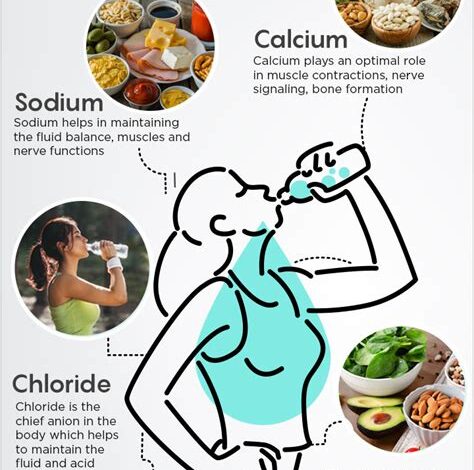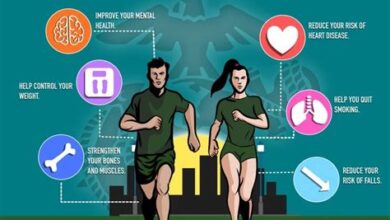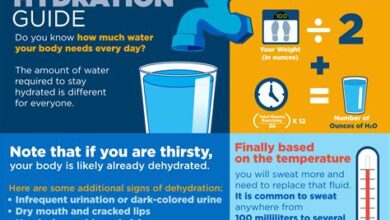Hydration and Electrolytes: What You Need to Know

Discover the importance of hydration, effects of dehydration, and strategies for proper hydration. Understand electrolytes and signs of imbalance.Staying hydrated is crucial for maintaining optimal health and well-being. The human body is composed of about 60% water, which emphasizes the vital role that hydration plays in our everyday functions. In this blog post, we will delve into the significance of hydration and the effects of dehydration on the body. Additionally, we will explore the role of electrolytes in maintaining proper hydration levels and the signs of electrolyte imbalance. Finally, we will discuss strategies for ensuring that you are adequately hydrating and maintaining a healthy balance of electrolytes in your body. Understanding the importance of hydration and electrolytes is essential for overall health, and by the end of this post, you will have a comprehensive understanding of what you need to know to stay properly hydrated and maintain the balance of crucial electrolytes in your body.
The Importance of Hydration
Hydration is crucial for maintaining overall health and well-being. The human body is made up of about 60% water, and every system depends on it to function properly. Water helps to regulate body temperature, protect vital organs, and lubricate the joints. It also plays a key role in digestion, nutrient absorption, and the circulation of oxygen and nutrients throughout the body.
Proper hydration is essential for supporting physical performance and cognitive function. Dehydration can lead to fatigue, headaches, and decreased concentration. It can also impair exercise performance and recovery. As the body loses water through sweat and urine, it’s important to replenish these fluids to prevent dehydration and maintain optimal function.
When it comes to hydration, it’s not only about the quantity of water consumed, but also the quality. Choosing water-rich foods, such as fruits and vegetables, can contribute to overall hydration levels. Additionally, consuming beverages that contain electrolytes, such as sports drinks or coconut water, can help maintain the body’s electrolyte balance and enhance hydration.
Effects of Dehydration on the Body
Effects of Dehydration on the Body
Dehydration occurs when the body loses more fluids than it takes in, leading to an imbalance in the body’s electrolytes. When this happens, the body is unable to perform its normal functions, which can have serious consequences for your health.
One of the most immediate effects of dehydration is a decrease in energy levels. When you are dehydrated, your body is unable to efficiently transport nutrients and oxygen to your cells, leading to fatigue and a lack of energy.
Dehydration can also have a significant impact on your cognitive function. Studies have shown that even mild dehydration can impair your ability to concentrate, make decisions, and stay focused. This can be particularly dangerous if you are driving or operating heavy machinery.
Understanding Electrolytes and their Role
Electrolytes are essential minerals found in the body that play a crucial role in maintaining proper hydration, nerve and muscle function, and overall balance within the body. These electrolytes include sodium, potassium, chloride, magnesium, and calcium. Each of these minerals helps to regulate the fluid levels in the body, and a proper balance of these electrolytes is vital for optimal health.
When there is an imbalance of electrolytes, it can lead to various health issues such as muscle cramps, fatigue, irregular heartbeat, and even seizures. It is important to understand the role of each electrolyte and the impact it has on the body in order to maintain proper balance and prevent these adverse effects.
One way to ensure a proper balance of electrolytes is to consume a well-rounded diet that includes foods rich in these minerals. Additionally, staying properly hydrated by drinking an adequate amount of water throughout the day is essential in maintaining electrolyte balance. Being mindful of fluid intake, especially during physical activity and in hot weather, can help prevent dehydration and the associated electrolyte imbalance.
Signs of Electrolyte Imbalance
Electrolytes play a crucial role in maintaining the balance of fluids in our bodies, as well as regulating muscle and nerve function. When there is an imbalance of electrolytes in the body, it can lead to various health issues. One of the key signs of electrolyte imbalance is muscle cramps and spasms. These can occur due to low levels of potassium, calcium, or magnesium, which are essential electrolytes for muscle function.
Another common sign of electrolyte imbalance is fatigue and weakness. When the body lacks sufficient electrolytes, it can affect energy levels and lead to feelings of tiredness and weakness. In severe cases, electrolyte imbalance can also cause irregular heartbeat, confusion, and even seizures. These symptoms can be a clear indicator that the body is not getting the necessary balance of electrolytes it needs to function properly.
It’s important to be aware of the signs of electrolyte imbalance and to take steps to address them. This can include consuming electrolyte-rich foods and drinks, such as bananas, oranges, and coconut water, as well as staying properly hydrated. Additionally, for those who engage in strenuous physical activity or spend time in hot environments, it’s crucial to replenish electrolytes lost through sweating to avoid potential imbalances.
Strategies for Ensuring Proper Hydration
Proper hydration is crucial for overall health and well-being. Hydration plays a vital role in maintaining bodily functions and preventing dehydration. It is important to ensure that you are consuming an adequate amount of water and other fluids throughout the day to stay properly hydrated.
One strategy for ensuring proper hydration is to carry a reusable water bottle with you wherever you go. Having easy access to water can help you drink more consistently throughout the day. You can also set reminders on your phone or use a water tracking app to help you monitor your fluid intake.
Another important strategy is to pay attention to your thirst cues. Thirst is your body’s way of signaling that it needs more fluids. It’s important to listen to these cues and drink water whenever you feel thirsty, even if you don’t feel extremely thirsty.





